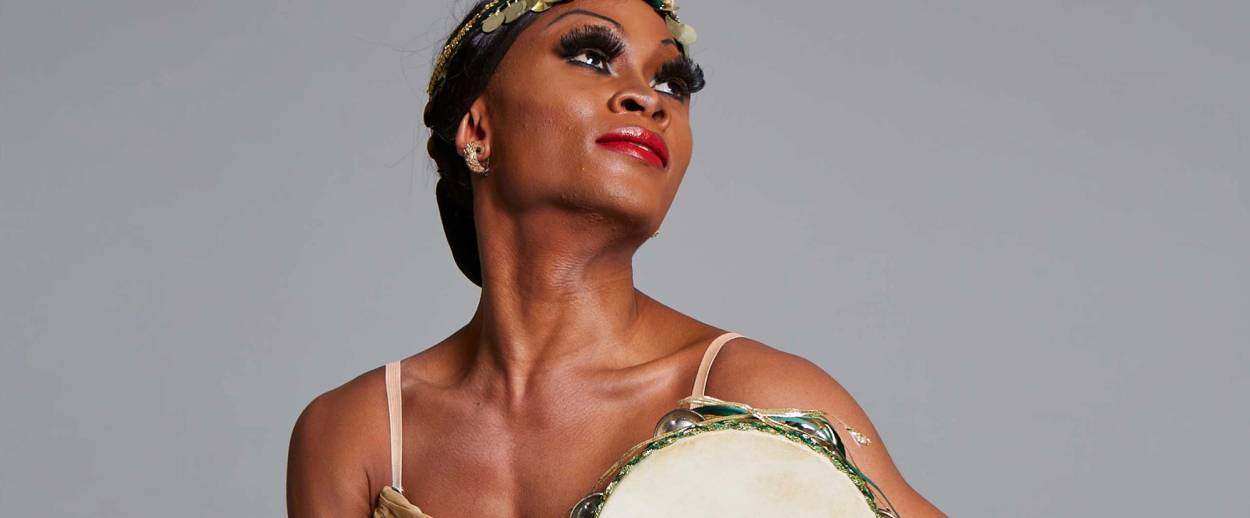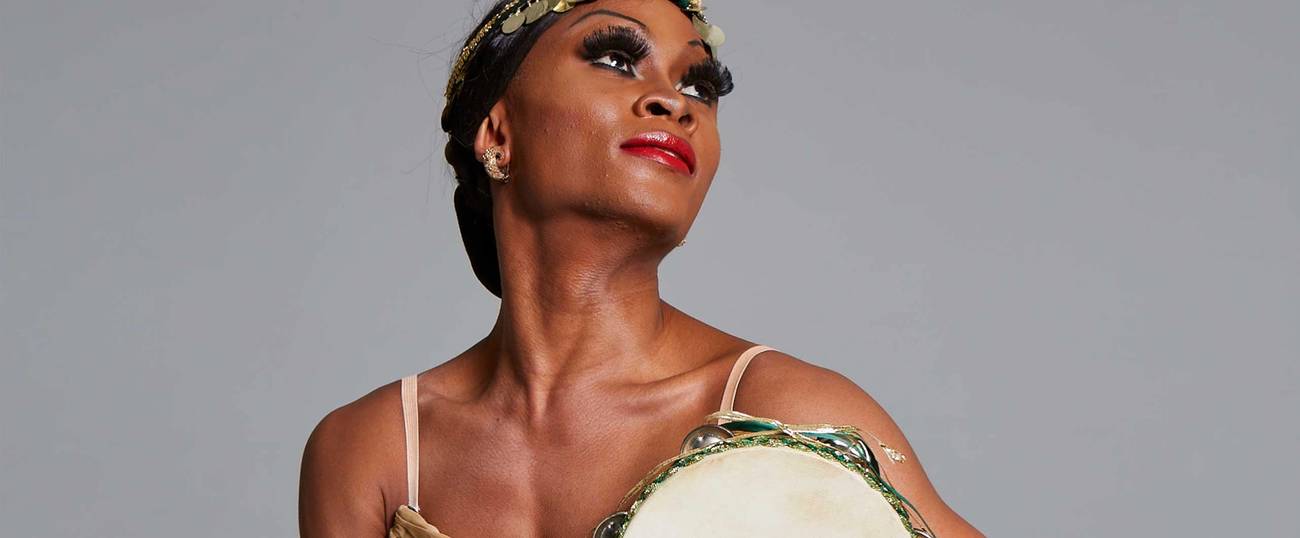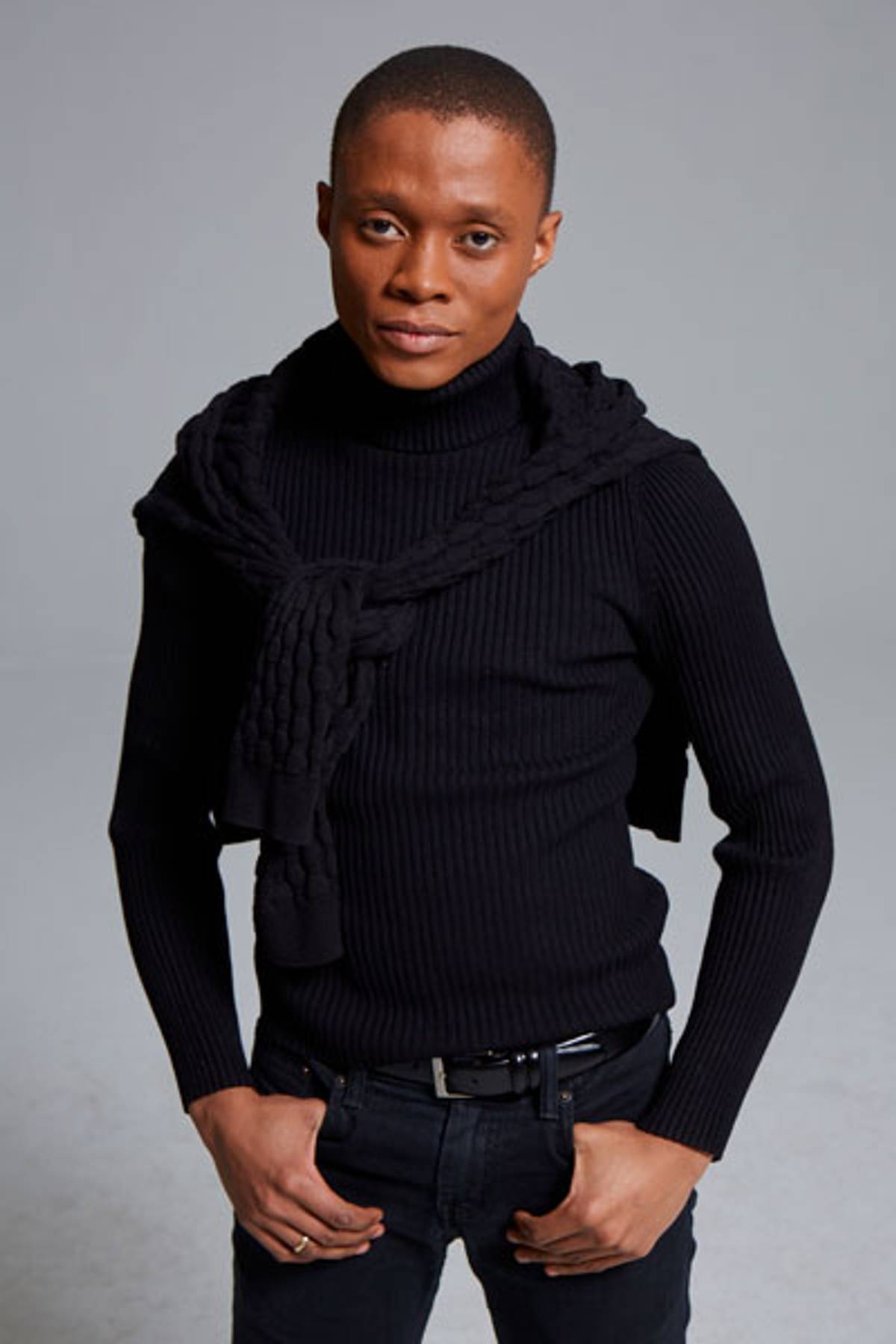A Journey to Judaism on Pointe
Boysie Dikobe, a South African-born dancer with Les Ballets Trockadero de Monte Carlo, prepares for his conversion—when he’s not performing in drag




For Boysie Dikobe, a typical Friday night includes lighting candles and saying brachot in a theater dressing room, applying full drag makeup while watching livestreamed Kabbalat Shabbat services, and then stepping onstage in pointe shoes and a tutu.
“I’m that weirdo walking around with a kippah and lashes this long,” said the 28-year-old dancer, gesturing several inches in front of his face. Dikobe is a member of the prestigious all-male comedic ballet company Les Ballets Trockadero de Monte Carlo (fondly known as The Trocks). And as of Rosh Hashanah, Dikobe will officially be Jewish.
Though he’s been working toward a Conservative conversion since 2016, Dikobe’s journey toward Judaism started at a young age. He was born into a church-going Methodist family in northwest South Africa, where he lived at his grandmother’s house and boarding schools until joining his parents in Johannesburg at age 8. There he became a child actor, working professionally both onstage and onscreen. When he was 10, he stumbled into a ballet class at his primary school and, despite being the only boy, and older than the rest of the students, asked to join.
Though he continued to attend Methodist Sunday school, the more time Dikobe spent in the arts world, the more he started questioning the tradition in which he’d been raised. “I was having trouble sleeping, fearful that I was going to burn in hell for even thinking sinful thoughts,” he said. Dikobe’s growing frustration with his religion coincided with his burgeoning sexuality; at age 12, he came out as gay. “I had so many questions, like why if God loves me he would do this to me or want me to be afraid,” he said, “and I was told to stop asking.”

The next year, Dikobe entered Johannesburg’s National School of the Arts. As a boarding student, Dikobe spent his weekends at friends’ houses. Most of those friends were Jewish, and he was struck by how much they looked forward to catching up with their families on Shabbat. “There was a sense of community, and so much love that I didn’t have,” he said. Dikobe occasionally tagged along to synagogue with his friends for a cousin’s bar mitzvah. He didn’t see other black people in these spaces, but that never stopped him from feeling at home. “I couldn’t understand why I felt safer in those settings,” he said. “It was a different feeling than I had sitting in church. I felt whole.”
At 15, Dikobe left school to join South African Ballet Theatre and officially moved in with a friend’s family. Two years later he participated in the inaugural South African International Ballet Competition in Cape Town and won a full scholarship to the Washington School of Ballet in Washington, D.C. It was also there that he met Charla Genn, a Jewish South African ballet teacher based in New York who took Dikobe under her wing, and continues to provide valued mentorship.
After one year in D.C., Dikobe moved to New York for a job with the now defunct company Les Ballets Grandiva. Dikobe’s first few years in New York were difficult, and by 2011 he was considering going back to South Africa to “regroup.” But Genn, who was teaching The Trocks at the time, suggested that he audition for the company. Dikobe showed up to the audition sick with bronchitis and coming off a 14-hour flight, and was nevertheless offered a contract. But finding his place in The Trocks took time. The company spends 85% of the year on tour, and beyond learning the troupe’s extensive repertoire—joke-laced yet rigorous renditions of much of the classical ballet and modern dance canon, as well as original works—Dikobe had to develop his drag persona. Whether they’re dancing male or female roles, The Trocks are always in drag, poking fun at the rigid gender roles historically played out in ballet onstage. When a new company member joins, they’re passed down stage names parodying European stars of old; Dikobe performs as both Sonia and Andrei Leftova. Slight and soft-spoken, Dikobe is naturally shy; he relied on his childhood acting training to develop a comedic presence onstage. And while he had a leg up in terms of dancing on pointe (though rare for men, he’d experimented with pointe shoes throughout high school), getting the hang of his drag look was considerably less smooth. While many members of The Trocks perform in drag outside the company, for Dikobe it’s just a part of the job. “I’m pretty conservative in my personal life,” he said, “so it’s nice to get to live out my queer identity onstage.”
Since moving to the U.S., Dikobe’s connection to Judaism had faded into the background. Yet spirituality remained a big part of his life. “I was chanting and meditating. I figured if I’m not going to do the religion thing at least I’d have that,” he said. But during his first year with The Trocks, the company toured to Tel Aviv, and everything shifted. On a day off, the dancers visited the Western Wall. “I just stood there, and I started tearing up because it’s like I had been there before, but I can’t explain how,” said Dikobe. “It felt like home. There was an energy and a pull, and that’s when I knew I was ready to convert.” After years spent messily trying to forge his own path, this was a moment of much-needed clarity.
Over the next few years Dikobe kept his revelation private, relegated to online research. The time was also consumed with recovery; two hip replacements required a break from dancing. But in 2016 his childhood friend Clare Milsom, whose non-Jewish family he’d lived with as a teenager, told him that she was engaged to a “nice Jewish boy” and was starting her own conversion process (today her surname is Milsom Meyerowitz). “That was a big inspiration for me to start,” said Dikobe. “I wasn’t going to wait for another sign.”
Dikobe found the queer, progressive synagogue Congregation Beit Simchat Torah through a Google search, and attended his first Friday night service. “I was so nervous,” he said. “I was already overdressed, wearing a suit and white shirt because coming from South Africa that’s how people dress for shul. And I’m black; I was already going to stand out.” First-timers were invited to stand up and introduce themselves. “Without thinking, I said that I was interested in converting to Judaism,” said Dikobe, laughing. This was the first time he’d ever vocalized his desire out loud, and he did so in front of a group of strangers; even three years later, he still can’t believe it. “There was this warm response,” he said. “People came up to me saying congratulations, and asking what they could do to help.” Dikobe came back to services the next morning, and arranged a meeting with CBST’s cantor and rabbi for the following week.
Dikobe’s initial elation was met with frustration; he realized that due to his touring schedule, there was no way he would be able to attend regular conversion classes. A friend connected him with Charles Simon, a retired Conservative rabbi who’s written extensively on demographic shifts within the movement. “I took Boysie as a student because he had a calling,” said Simon, who agreed to work with Dikobe one-on-one. “We started with holidays, practical prayer, and Jewish history. Every two weeks he’s in a different country, so the challenge was to help him develop a knowledge base so he could work on his own while he was away.” When talking about the amount of reading that Simon assigns, Dikobe joked: “That’s how I learned we’re the people of the book.”
In addition to his studies, connecting with converts through CBST and Romemu has helped Dikobe realize the ways that becoming Jewish extends beyond religion. Learning about Jewish food and kashrut have been a part of that; Shabbat and holiday observance are another, made all the more tricky by Dikobe’s work schedule. With Simon’s help, he’s found Jewish havens around the world to visit while he’s on tour, forcing him to take agency of his practice rather than rely on a single community. He attended Kol Nidre services in London last year before dancing two shows while fasting. “I didn’t have to dance all day without a drop of water, but if I don’t do it now then I won’t know how it will fit into my life,” he said.
Celebrating holidays on tour has also given Dikobe a chance to share his conversion process with his colleagues. He took one of his closest friends in the company, Giovanni Ravelo, with him to a Passover Seder at the University of Virginia this spring. “I’ve learned a lot, from words in Hebrew to the meaning of the holidays and rituals,” said Ravelo, adding, “I can see this was a good choice in his life.” For Dikobe, watching the CBST livestream while getting ready to perform on Friday nights is now an important part of his pre-show ritual. “It’s actually great because it’s so meditative for me,” he said. “I still get nervous before going onstage, but it’s not my main focus. I definitely feel my best during Friday shows.”
Dikobe returns to South Africa about once a year, and though his family is indifferent to his conversion, he’s always eager to see the Jewish friends with whom he grew up. Yet observing the stringency of South African Jewish life makes him appreciate the progressive community he’s part of in New York. Though Dikobe seldom encounters other Jews of color in either country, it’s something he rarely considers. “Growing up as a black person in South Africa post-apartheid, coming out of the closet at 12, dancing for a nontraditional company, I just end up forgetting that I’m on the outside,” he said. “So adding the Jewish identity to my life is OK.”
Every day, Dikobe wears a necklace with two pendants: a chai and a Magen David. Like his Judaism, it’s become both a source of comfort and a sense of pride. He fingers the charms when he’s anxious, and he values the public indicator of his Jewishness that they provide.
Though the final steps of Dikobe’s conversion are still ahead, he’s getting close. In his last meeting with Simon, he read a few sentences of Torah aloud without any help. And this is just the beginning. “I said when you finish, what do you want to do,” said Simon, “and Boysie said he wants to keep on learning.”
Converting has also helped Dikobe to reprioritize. Once his days with the The Trocks come to an end, he hopes to settle down someplace quiet; he dreams of spending a few years on a kibbutz in Israel. “It’s been challenging, but I’ve never felt so grounded,” he said. “I’m not just making a decision about a religion. I’m making a decision about how I want to live the rest of my life.”
Chava Pearl Lansky is a New York-based dance writer. She’s an Assistant Editor at Pointe, and has written for Playbill, Musical America, and Dance Magazine.